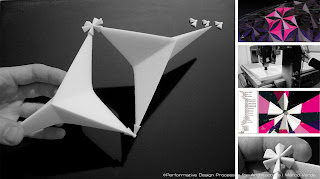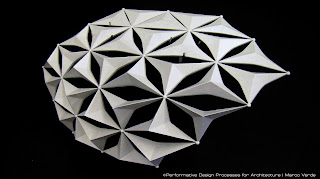The architectural domain seems increasingly interested in investigating novel strategies and processes from design to final materialization. Especially the advent of an empirical aptitude is setting the basis for the replacement of exhausted rationalistic design approaches and already acquainted processes of metaphorization.
The research in Performative Design Processes for Architecture targets a non-linear and holistic approach to architectural design while stressing the necessity for an interdisciplinary aptitude. In this framework, the process of design becomes a performative process that generates knowledge at every stage, from design to final materialization, while it aims to blur the boundaries of disciplines.
Studies in computationally advanced design techniques, data-driven fabrication processes, composite materials (i.e. structures), form-finding techniques, material systems, mass-customization and morphogenetic design strategies are at the core of [P]a's agenda. MV
RES3.1 | Material Systems | 2006-2010
Performative Design Processes for Architecture develops in-depth investigations in Material Systems and physical Form-Finding strategies. Currently, the design-research territory is investigated consistently within a limited number of well established education-research programs and academic institution such as the Emergent Technologies and Design programme–EmTech, directed by Michael Weinstock at the AA Architectural Association (London), the Institute for Computational Design, directed by Achim Menges(Stuttgart), and the Bio Design Research Group-BioDLab, directed by Jordi Truco at ELISAVA-Pompeu Fabra (Barcelona).
Performative Design Processes for Architecture aims at contributing to the further development of such ongoing research. Under the guidance of Marco Verde, researchers and designers investigate the dynamics and processes responsible of the emergence of articulated organizations of matter in space and time. Through structural form-finding based design techniques, form is investigated as actual expression of synergic processes of material auto-organization and adaptation. Hereby, physical investigations, material science, and advanced computational processes for design and manufacturing combine to shape an integral approach to architectural design.
RES2.1 | [M]SYSTEMS. Multi Performative Efficient Systems. (MES) | 2009
In order to address the demands of an ever-increasingly data-driven architectural practice, the designer must become an interdisciplinary specialist. Employing data-driven techniques requires a solid understanding of not only digital design tools, but also material performances and the manufacturing process. Therefore, it is necessary to rethink new strategies in order to establish a robust connective tissue between disciplines and specializations.

Parametric-associative system ready to fabrication
In a data-driven architectural practice, an aptitude for exploration and advanced experimentation in generative techniques is needed for the entire design process, from the earliest experiments to the final production phase. Therefore, bringing new digital productions to the scale of a real building implies the need for radical innovation in non-standardized building solutions. This paradigm shift implies rethinking buildings as systems rather than the juxtaposition of optimized and monofunctional layers.
One of the main challenges of data-driven architectural practice is maintaining consistency from design to materialization. Thus, by pursuing a holistic, nonlinear approach and an interdisciplinary practice, designers can move away from a traditional linear production workflow based on a succession of fragmented processes. Through the pursuit of data-driven architectural practice, the boundaries between the specializations of architect, engineer, and manufacturer become blurred.
Project development. Parametric-associative strategies for design and manufacturing.
© Performative Design Processes for Architecture. All rights reserved.
[M]Systems is a sample of the personal research agenda on Performative Design Processes for Architecture. [M]SYSTEMS is a research project pursuing the generation of MES through morphogenetic design strategies. By pursuing a holistic nonlinear approach the author developed a parametric-associative adaptable system.

Genotype definition
System adaptations are achieved through parametric modulation of its performative components. All adaptations are restricted to the components' modulation capacity.

Phenotype multiple adaptations
Furthermore, the system integrates in its logic both manufacturing and assembly constraints and behaves according to these.

File to Factory
Due to the integral design method, the system can be real-time manufactured (employing a 3 axis CNC milling machine) in each one of the possible morphological configurations. Once being CNC produced, all system's components are ready to be assembled. Production is not addressed to a phase of post design optimization, but is integrated in the design process.

Stereolitography (SLA). Protoype sponsered by ARRK Europe (BCN)
Hence, the system can be efficient catalyst of multiple performative capabilities by integrating structural, environmental, assembly and manufacturing features. In addition, non-designed qualities - like the emergent, locally differentiated porosity - increase the performative richness of the whole.
Project Credits
Author: Marco Verde Eng, MArch
Sponsors 2009
TopSolid/Missler Italy (Software); ARRK Europe, BCN (Rapid Prototyping)
Sponsors 2008
TopSolid/Missler Spain (Software); ZCorp, BCN (Rapid Prototyping); EsArq-Lab (CNC)
Pubblications
2009
Acadia 09_reForm()
Exibitions/Lecture/Parametric Design and Digital Fabrication Demo
2009
AAST Advanced Architecture Settimo Tokio Biennale 2009-2011. Settimo Torinese, Italy.
Sponsors: [P]a, Missler TopSolid Italia, ARRK Barcelona
2008
Hyperbody. Non-standard and Interactive Architecture Master's degree program. TU Delft
2008
Simae. Symposium of Emergent Architecture Barcelona. UiC_EsArq.
Sponsors: [P]a, UiC-EsArq, Tecnocim - Missler TopSolid, ZCorp
////////////////////////////////////////////////////////////////////////////////////////////////////////////////////////
RES1.1 | CONTEMPORARY STRATEGIES AND PROCESSES FOR ARCHITECTURE | 2008

Contemporary Strategies and Processes for Architecture is a research work that discusses the chance that today’s practitioners have to rethink their strategies and approaches to architectural design while developing a new interdisciplinary aptitude.
Contemporary Strategies and Processes for Architecture rises from three years of intensive professional and academic dedication and studies. The further investigations developed in computationally advanced design techniques and computer-based technologies for design and manufacturing, have been crucial to the understanding of the role of contemporary Information Technology (IT) for the innovation in architectural practice.
Contemporary Strategies and Processes for Architecture illustrates and analyses a repertory of research frameworks and advanced design strategies investigated during the Design Studios within the Masters' Degree Program in BioDigital Architecture at EsArq in 2005 and led by Karl Chu, Evan Douglis, Sylvia Felipe, Achim Menges, Lars Spuybroek, Ludovica Tramontin, Jordi Truco and Michael Weinstock.
Form Finding, Material Systems, Emergence, Biomimetic, Formal Systems, Morphogenesis, Morphogenetic Design Strategies, Digital Design Strategies and Tools for architectural design, Digital Fabrication and Parametric Design are some of the topics investigated across all chapters.
Contemporary Strategies and Processes for Architecture has been presented at EsArq in 2008 for the obtention of the DEA degree (Diplma de estudios Avançados)
